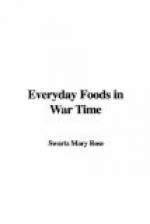And so the Nutrition Expert was asked to talk about “potato substitutes” and expected to exercise some necromancy whereby that which was not a potato might become a potato. Now, the Nutrition Expert was very imperturbable—not at all disturbed by the calamity which had befallen our tables. That unfeeling person saw potatoes, not in terms of their hot mealiness and spicy mildness, but in terms of that elusive thing called “DIET.” The vanishing tuber was bidden to answer the dietary roll-call:
“Proteins?”
“Here!” Answer somewhat faint
but
suggesting
remarkable worth.
“Fats?” No answer.
“Carbohydrates?” Loud note from “Starch.”
“Mineral salts?”
“Here!” From a regular chorus,
among
which “Potassium”
and “Iron”
easily distinguishable.
“Vitamines and “Here! Here!” Especially vociferous, the Other Accessories?” “Anti-Scorbutic Property.”
“This is a good showing for any single food material. The potato, as truly as bread, may be called a ‘staff of life.’ Men have lived in health upon it for many months without any other food save oleomargarine. Its protein, though small in amount, is most efficient in body-building, its salts are varied in kind and liberal in amount, and it furnishes a large amount of very easily digested fuel besides. It is at its best when cooked in the simplest possible way—baked or boiled in its skin. Nevertheless we are not absolutely dependent upon the potato.”
“Alas,” said the housewife, “this doesn’t tell me what to cook for dinner!” “Patience, Madam, we shall see about that.” The fact that starch is present is what makes the potato seem so substantial. But bread, rice, hominy, in fact, all cereal foods can supply starch just as well. Pick out the one you fancy and serve it for your dinner. One good-sized roll or a two-inch cube of corn bread, or three-fourths of a cup of boiled rice will sustain you just as well as a medium-sized potato. A banana, baked or fried, makes an excellent substitute for a potato. An apple is also a very palatable potato equivalent, if you want something more spicy than hominy or corn bread. Why mourn over the lost potato?
But how about those mineral salts? Well, the potato has no monopoly on those, either, though it is ordinarily a very valuable contributor. Milk has already been mentioned as one of the great safeguarding sources of so-called ash constituents. Others are vegetables and fruits of different kinds. These have been a neglected and sometimes a despised part of the diet: “Why spend money for that which is not meat?” is often taken literally. Even food specialists have been known to say, “Fruits and vegetables are mostly water and indigestible fiber; they have little food value.” This is a good deal like saying, “If your coat be long enough you do not need a pair of shoes.” A potato has as much iron as an egg yolk or a medium-sized




